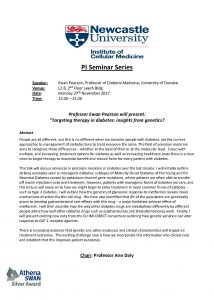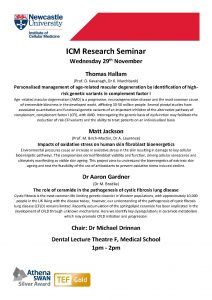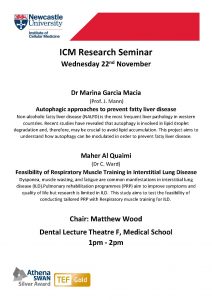- ERDP Development Grants are available during 2017/18. These grants are designed to offer financial support to staff who want to explore innovative approaches to learning and teaching that have the potential to inform curriculum development, provide an opportunity for personal development and will benefit staff and students both here and, through dissemination at conferences, nationally.
- Go to the Development Grants web page for a copy of the application form and some guidance notes
- Submission dates are Friday 15 December 2017, Tuesday 8 May 2018 and Friday 6 July 2018
Monthly Archives: November 2017
ULTSEC Innovation Fund
- Submission dates for the ULTSEC Innovation Fund for 2017/18 are available on the LTDS web page.
- The Learning and Teaching Development Service will be running webinars and workshops during January & February, available to book via the Learning and Teaching Development Programme. Please contact LTDS@ncl.ac.uk with any queries you may have regarding the ULTSEC Innovation Fund.
- Remaining submission dates for responsive project proposals for this academic year are Spring – 4pm on Monday 12 April 2018 and Summer – 4pm on Wednesday 30 May 2018. For strategic project proposals the submission dates are: Semester 1 – 4pm on Monday 22nd January 2018 and Semester 2 – 4pm on Monday 21 May 2018
Edubites Series Info
Faculty Post-Doc Symposium
The first Faculty Post-Doc Symposium will be held on Friday 15th June 2018 to showcase the outstanding contributions and research of post-doctoral staff across all Institutes. This is the first symposium of its kind for FMS, organised by the newly-formed Post-Doctoral Committee.
We are delighted to have a keynote talk from Prof. Steve Wilson, Professor of Developmental Genetics at UCL, who will also present a prize for best published paper. Prizes will also be awarded for best talk and for best poster.
Calls for abstracts and papers from any post-doc working or affiliated with any FMS institute will open on Monday 5th December 2017 at 9am, and we wish to invite a wide range of talks to truly demonstrate the diversity of research conducted by post-docs across the Faculty. Submissions will close on Monday 30th April (Easter Monday) at 5pm.
We have secured generous sponsorship from Promega, Sigma, Invitrogen, Merck, Thermofisher Scientific, New England Biolabs, Diagenode and Active Motif, who will be providing material for goody bags on the day for all attendees as well as sponsorship for poster, talk and paper prizes.
We encourage all Faculty to attend to help us celebrate our fantastic work.
December’s Journal Club
will be held 1-2pm next Friday (1 December) in room 1.57, Ridley building 2. The paper which will be presented for discussion by Dr Ellen Tullo, School of Biomedical Sciences is:
Ten Cate, O & Durning, S (2007). Dimensions and psychology of peer teaching in medical education Medical Teacher 29(6):546-52
Lunch will be provided, please sign up using this short form as soon as possible if you plan to attend.
MQ: Data Science Award
https://www.mqmentalhealth.org/research/apply-for-our-data-science-award
Deadline: 22nd January 2018
Amount: £50k, total budget of £200k for 2018 (annual call)
Duration: between 6 and 24 months
Eligibility: Must have minimum of 3 years Postdoc experience
The Data Science Award will enable successful awardees to obtain pilot data or proof of concept needed in order to obtain follow-up funding from other sources.
The project must address a question relevant to mental health.
The project should, directly or indirectly, improve prevention, diagnosis, treatment and care options, and lead to a better understanding of mental health and illness.
The project should make use of existing UK data resources in an innovative way
Existing data resources could include routinely collected data (health, social, educational, or other administrative data), data from longitudinal studies, tissue banks, etc., or naturalistic data streams.
Projects that seek to enrich existing data e.g. through linkage, or projects that develop new tools to collect, access, or query the data are also eligible
International collaborations are eligible, provided that UK data resources are a key component of the project.
Applicants must explain how they will be able to access the designated data resources and/or to perform linkage studies as needed within a secure platform for analysis.
MQ are especially interested in applications that focus on the following:
- Research questions in children and young people’s mental health and mental health over the lifespan
- Proposals which include academic and non-academic partners
- Proposals which include collaborations across the four countries of the United Kingdom
Funds may be used flexibly, including for any of the following:
- start-up funding for a specific project, transition funding for a current project, co-funding with other funding sources
- direct research costs, e.g. computing costs; data access costs
- salary support: for the applicant themselves; for research staff as appropriate.
A sample application document is available to download through the link above.
Please ensure to read the full call guidance document (pdf), also available from the link above.
PI Seminar – E Pearson – Monday 27th November
ICM Research Seminar – 29.11.17
ICM Research Seminar – Wednesday 22nd November
BBSRC TRDF: Transformative Research Technologies
http://www.bbsrc.ac.uk/funding/filter/2017-tools-resources-development-fund/
Deadline: 05th December 2017
Amount: up to £150,000 (£187,000 fEC), total scheme budget up to £3.5M
Duration: 6- 18 months (starting no earlier than 1 July 2018)
TRDF aims to pump prime the next generation of cutting-edge enabling technologies with a potential for transformative impact in life sciences research (both biological and biomedical).
A fast-track, light touch peer review process will operate to enable researchers to respond rapidly to emerging challenges and opportunities.
There will only be a single TRDF call in 2017, supporting instrumentation, tools, and software relevant to Technology Touching Life (TTL).
The budget includes significant co-funding from EPSRC and MRC as part of their commitment to collaborative working TTL.
The call is intended to pump prime development of early stage research technologies for discovery research in the life sciences.
Applications must be an exciting, original, early stage project and clearly articulate why the proposal is in line with the scope of the call.
This call intends to support small and short ‘high-risk/high reward’ pilot studies directed towards development of a new technology, particularly where little to no preliminary data exists.
The outcome of the application does not necessarily need to be a fully-fledged tool, but could be publication of proof of concept, or production of a prototype for further development.
Applications are expected to focus on one or more of the following:
- New advances in engineering and physical sciences research that have the potential to result in innovative and potentially disruptive technological capabilities. Such applications must aim to establish proof of concept and identify a clear trajectory towards a new life sciences research technology in the short term
- Development of technologies that will provide new research capabilities with applicability to a range of life sciences research problems and/or communities
- Innovative improvements to current technological capabilities that deliver a step change in aspects such as accuracy, precision, resolution, throughput, and breadth of application to facilitate new research discoveries.
Additionally, the call supports:
- development of software tools and algorithms to address key data analysis and modelling challenges in life sciences research that demonstrate genuine innovation and originality, as well as potential utility.
All applications are expected to outline how the research might deliver a substantial improvement versus current state-of-the-art and how the project could broadly enable new avenues of life sciences discovery research.
Applicants must outline the extent of the potential impact outside of their own specific research programme.
Please ensure to read the full call guidance and FAQ documents available through the link above.



